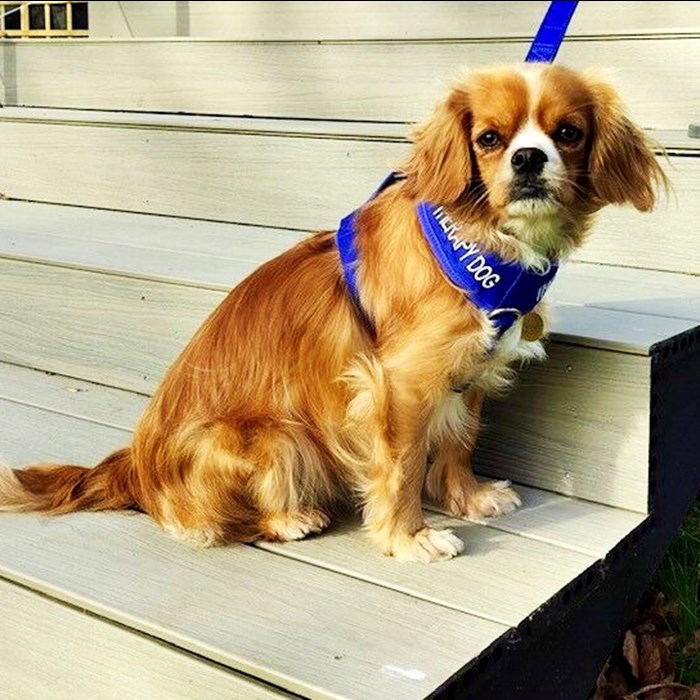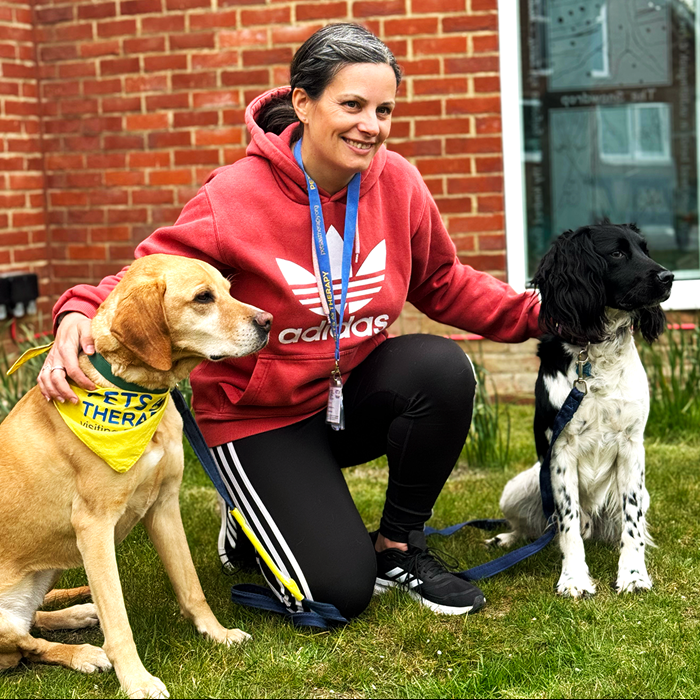At Demelza, we are lucky to have therapy dogs who regularly visit our hospice to see the children and families we support. Waggy tails, puppy cuddles and endless games of fetch means they never fail to brighten our day! But what actually is a therapy dog?
Therapy dogs: providing extra-pawdinary support
At Demelza, we are lucky to have therapy dogs who regularly visit our hospice to see the children and families we support. Waggy tails, puppy cuddles and endless games of fetch means they never fail to brighten our day! But what actually is a therapy dog?
What is a therapy dog?
For most of us, there’s no happier company than a dog! But therapy dogs are professional pals – they are specially trained to offer comfort and support to people, helping to improve emotional wellbeing and quality of life. There are lots of different types of therapy dog – some visit places like hospices and hospitals, while others help people cope in disaster situations or even support witnesses during police interviews.
How does a dog become a therapy dog?
Therapy dogs are given expert training to make sure they are the perfect companions – they need to have good manners and remain calm, as well as being comfortable around different kinds of people. There are a few therapy dog organisations in the UK that will certify therapy dogs where they are assessed for their temperament and behaviour, as well as how they handle different situations and interactions.
How do therapy dogs help people?
Therapy dogs provide all-round wellbeing support:
- Reducing stress and anxiety: it’s been proven that stroking animals can help lower blood pressure, while spending even just a short time with them can reduce levels of the stress hormone, cortisol, in our bodies.
- Creating happiness: when cortisol is lowered, our happy hormones rise, making us feel better and more joyful.
- Feeling connected: simply having companionship, especially a dog’s unconditional love, helps people feel less lonely. Playing with a dog is also fun! This boosts energy and releases feelgood endorphins.
- Overall wellbeing: over time, all of this contributes to improved wellbeing and health.
How do therapy dogs help children at Demelza?
For children at Demelza, life can be challenging, and a visit from our therapy dogs can help them live in the moment, have fun and simply be children. There is also growing evidence that therapy dogs can support with children’s development, including vocabulary and social skills, as well as providing a calming, soothing presence to support children’s emotional wellbeing during difficult times.
Meet some of Demelza's therapy dogs!
Bella
Bella is a Cavachon (Cavalier cross Bichon), who was an incredibly gentle, kind and steady puppy. When she was a year old, her owners Janet and David decided to register as a Pets as Therapy (PAT) dog and she passed her assessment with flying colours! Bella is now a regular visitor at Demelza and is often requested by the children for cuddles, walks and play.
“Bella loves going to Demelza. We arrive and she looks out the back of the window of the car and she jumps down and disappears in the front door with us trailing behind her. It does not matter who it is, or what it is, Bella will be there for them.
She never holds back. Bella will stand there and wait for the child to decide. If it is a child that is in a bed or a chair, we will hold her up so she can see them and be with them. Everybody is Bella’s friend.”
- Janet and David, Bella’s owners

Nala and Buddy
Nala is a nine and half-year-old Labrador cross Portuguese Pointer, while Buddy is a two-year-old Sprocker Spaniel. Their owner Jemma is a former police officer who loves helping people and wanted to continue to make a difference to people’s lives.
“I feel that bringing the dogs into Demelza brightens people’s day - not only because of their ever-cheerful wagging tails, which always put a smile on your face, but they seem to understand what the children need and adapt their behaviour accordingly.
They know when to be very calm and still and allow the children to feel peace by stroking them, and they also know when to interact with the children and play games and be more interactive. I love bringing that little bit of joy to the children’s day.”
- Jemma, Nala and Buddy’s owner
